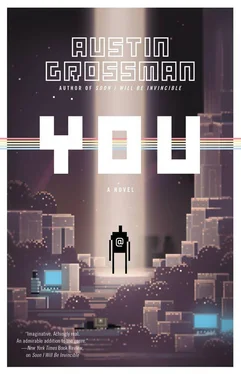And the dream-logic plots! Worlds where touching anything meant instant death; where mushrooms are friends and turtles are enemies. In each one I felt the presence of a deep logic living just offscreen, each one a bright painting telling a not-quite-explained story: Why am I a plumber fighting an ape for a princess? Why am I, a lone triangle, battling a fleet of squares? Who decided that?
And adults hated to be in there. It gave them headaches and made them look stupid when we all knew how to play and what to do because we were growing up with a technology whose buried rules made sense to us. In the swirling primordial mix of children and teenagers, hormones and technology were combining to form a new cultural idea. Some days I spent up to three hours in the arcade after school, dimly aware that we were the first people, ever, to be doing these things. We were feeling something they never had—a physical link into the world of the fictional—through the skeletal muscles of the arm to the joystick to the tiny person on the screen, a person in an imagined world. It was crude but real. We’d fashioned an outpost in the hostile, inaccessible world of the imagination, like dangling a bathysphere into the crushing dark of the deep ocean, a realm hitherto inaccessible to humankind. This is what games had become. Computers had their origin in military cryptography—in a sense, every computer game represents the commandeering of a military code-breaking apparatus for purposes of human expression. We’d done that, taken that idea and turned it into a thing its creators never imagined, our own incandescent mythology.
One summer in middle school I finally got an Apple IIe, a beige plastic wedge with computer and keyboard in one piece, along with its own nine-inch monochrome monitor. I discovered the delinquent thrill of using copy programs like Locksmith to duplicate copy-protected games on 5.25-inch floppy disks and the trick of double-siding a disk by clipping a half-moon out of it with a hole puncher.
The idea of simulating an alternate world had taken over thousands of otherwise promising minds. It was the Apollo program for our generation, or maybe the Manhattan Project was a better analogy. Because everyone wanted to do it, and every year it got faster and better. I could feel it, the chance, the generational luck of being born alongside a new artistic form, the way Orson Welles was born at the right time to make Citizen Kane and define the greatness of a medium. It was a chance to own the artistic revolution of our time the way Jane Austen owned hers and D. W. Griffith owned his.
When I ran a game, the splash screen would give the name of the hacker who cracked it, names like Mr. Xerox, the Time Lord, Mr. Krac-Man. Who were these people who cracked games? Who made them, for that matter? How on earth did you get that job?
It was time to find out. It was time to say something. I had an audience of four or five people now. People had been shuffling in and out of the conference room all day, to listen or ask a few questions. All men, though, until Lisa, the third founder of Black Arts, came in. She looked as I remembered—pale, with a big forehead that made her look like a cartoon alien. She’d ditched the flowery dresses for a tentlike oversized black T-shirt. I remembered her from high school, from car rides home at two or three in the morning. In winter she drove with the window rolled down and the heat going full blast.
“The Ultimate Game,” I said. “I can do just… anything?”
They nodded. I felt ridiculous. Was the Ultimate Game the one in which I ride a hundred-foot-tall pink rhino through the streets, driving my enemies before me? The one where the chess pieces come alive and talk in a strange poetry? Is it just the game where I always win?
“Relax, guy,” the short guy said. “It’s just whatever you’re into. Your game.”
It was hard to say what was so particularly odd about the two of them. Maybe it was that even though everything about them screamed “loser,” they didn’t seem to care. In fact, they carried themselves like kings in T-shirts.
“So… okay, okay. You’re playing chess, right, but all the pieces are actual monsters, and when you take one you have to… actually fight… it?” Why were they looking at me that way?
“You mean like in Archon ? For the C64?”
“Um. Right.” Lisa scowled even a little more. A bearded guy at the back rolled his eyes, as if in disbelief at what a loser I was; he was wearing a jester’s hat. It had come to this.
I’d wanted to say, but couldn’t, that what I really meant was the way it felt getting out of the car on that chill September morning, first day at Dartmouth, first day when I had a chance to be a new person and get it right this time after the hell of high school. How badly I wanted that moment back. Simon and Darren had chosen to be, well, awesome, and I hadn’t, I’d been a good little soldier and tried to be an adult, and up until today I’d forgotten that woman and the PET computer and what it felt like to be offered the future.
Before I left I had to stop off and see Don, the company’s fourth founder and current CEO. Unlike the other employees, he had an actual office, a side room with a picture window looking out on the dark expanse of the work area.
“Good to see you again.” He shook my hand firmly, a grown-up hello. “KidBits, right? How’ve you been?”
He was even taller than I remembered. He’d grown a beard, which suited him.
“Good, good. Is Darren around?” I asked.
“Still in Nepal. He’s the same guy he was. So you really want to work here?” he asked. This was the moment I’d rehearsed more than any other, actually done it in the mirror. Eyes averted, I slid into the faux-casual delivery.
“I kind of do, Don. Law’s getting a little boring—I’m on to the next thing, you know?”
“Design? Programming? Assistant producer?”
“Design, I guess. Or producing. I’m not sure. My programming’s as shitty now as it ever was.”
“Did Jared ask you the ultimate game question?”
“Yup. It was a good question.”
“It is, isn’t it? I guess we’ll call you.”
“Thanks, man.” We shook hands again.
On the way out Lisa brushed past me, apparently on her way back from the snack machine. “Nice one,” she said. “Archon.” They didn’t have things like Asperger’s in the eighties; probably they’d have given her something for it.
“Thanks,” I answered. “See you later.”
I wanted to linger and get more of a look at the games, but there was no pretext for it, so I let myself out into the chilly evening. Outside, I kept on thinking about the game, the game this would be if my life were a game. The lamest computer game of all time.
“You are standing in a half-empty parking lot beside an office building in suburban Massachusetts. The interview is over, and the sun is setting. What do you do next?”
LOOK
“You can see cars turning on their headlights as they crest the hill of Route Two and start the slow plunge toward Cambridge, then stack up through the Alewife traffic circle. It’s getting cold. You have nowhere to be.”
INVENTORY
“A worn leather wallet.
“Directions to the office, written on the back of a flier for an open-mike poetry reading.
“A navy blazer. You were incredibly overdressed this whole time.”
WEST
“You walk along the bike path. You pass behind seafood restaurant. Most of the land around the parking structure was never developed. Lilac, small oaks, and tall grasses grow out of control here. Where exactly do you think you’re going?”
WEST
“You can barely hear the highway behind you, and soon it fades out altogether. You can still see the sun through the branches overhead.
Читать дальше





![Ally Carter - [Gallagher Girls 01] I'd Tell You I Love You But Then I'd Have to Kill You](/books/262179/ally-carter-gallagher-girls-01-i-d-tell-you-i-lo-thumb.webp)






